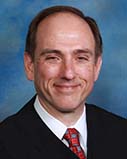
To celebrate Polish Heritage Month, we're highlighting diverse voices in the judiciary to uplift and inspire others in the community. The following features Chief Judge Michael Chmiel of the 22nd Judicial Circuit and his thoughts on his career, diversity, and more.
What motivated you to pursue law, and eventually, become a judge?
As a second-generation Polish American who was the first in my family to graduate college, a combination of personal and cultural influences, community values, and a drive to create a positive impact, motivated me to pursue law and eventually become a judge. Growing up in the inner-city of Chicago, I saw both challenges and resilience. The Rule of Law has motivated me to pursue and implement what is right and afford all access to justice.
What role models have you looked up to in your life and/or career?
Along with a strong belief in God, my father (Eugene) who passed when I was 17 and my mother (Josephine) who passed two days after I turned 30, have been my primary role models, teaching me to never give up and do what I can. Professionally, the late U.S. Bankruptcy Judge Richard DeGunther, along with U.S. District Judge Joan Lefkow, have inspired me as models of professionalism and civility.
When you reflect on your career, what accomplishments and challenges stand out to you?
I have been blessed with three wonderful children and great family and friends. Additionally, I believe I have contributed in numerous ways in my community and in my profession of law. Those are my accomplishments. Always wanting to do more and always wanting to do better have been continuing challenges for me. I strive to show up and add value when given the opportunity.
Why is diversity important on the bench?
Diversity on the bench is crucial for us, as judges, to instill confidence in those we serve, and in the Rule of Law, which is the cornerstone of our operations. Diversity provides for broader perspective and improved decision-making, as collaboration is our superpower (quoting Justice Lisa Holder White) through which we work to achieve better and more effective results on the matters brought to us to resolve.
What is one of your favorite traditions or customs of your culture? (Ex. Food, Special Event, etc.)
A favorite tradition and custom of my Polish American culture is sharing food, beverage, and spirit, whether it be with family, friends, and/or professional colleagues. This allows us to bridge gaps and help us focus on the most important things: life and community. At meetings of the Advocates Society – the association of Polish American Attorneys, we always include sharing food, beverage, and spirit, as we did when the Illinois Judges Association traveled to Poland in April of 2024.
How do you celebrate Polish Heritage Month, and what does it mean to you?
I celebrate Polish Heritage Month by attending the long-running Judges Night of the Advocates Society and attending events of the Polish American Police Association and other organizations of Polonia (which is how we reference the Polish American community in Chicagoland and beyond), including the Polish Museum of America. Having focus on my heritage means much to me and helps kindle the spirit that makes this neck of the woods so great.
Why do you think it’s important to recognize Polish heritage, not just this month, but every day?
It is important to celebrate Polish heritage every day because it helps define those of us of Polish heritage. Our Polish heritage has withstood the test of many conflicts and emboldens us to carry on and do what we can, where we can, and how we can. It reminds us to keep showing up, to add value, and to inspire others. Remembering our Polish heritage each day also challenges us to do and support what is right even when under attack.
Is there anything else you’d like to add on this topic?
The opportunity to address Polish Heritage is appreciated. It is especially meaningful because it gave me the opportunity to reflect on the many Poles who have inspired me, including those who were instrumental in Poland’s adoption of the first Constitution outside the United States, and legends like astronomer Nicholas Copernicus, revolutionary war heroes Casimir Pulaski (who helped start the American cavalry) and Tadeusz Kosciuszko (who helped establish West Point), composer Frederic Chopin, and Lech Walesa and St. Pope John Paul II (who helped bring down the iron curtain). Bardzo dziękuję - thank you very much!